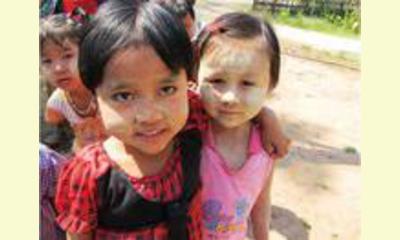|
|
UNESCO Initiates Peace Education Project in Northern Rakhine State of Myanmar with Support from the Belgium Government
un articulo por UNESCO Bangkok
The Ministry of Education in Myanmar has approved
UNESCO’s peace education project in Northern
Rakhine State. The announcement of the project’s
approval aptly coincides with the International
Day of Peace on 21 September with the theme of
“Education for Peace.” This reaffirms the
commitment of the Ministry of Education to promote
peace education as a means for fostering mutual
respect for cultural diversity at the school level
and to jointly implement the project with UNESCO
through funding support from the Belgium
government.

click on photo to enlarge
Following the recent communal violence in Rakhine
State, resulting in an ongoing humanitarian
situation which has affected hundreds of schools
and thousands of students, the government of
Myanmar and international community has identified
peace education as one of the priority to address
underlying causes of the communal tension. The
overall aim of the peace education project is to
enhance the capacity of school teachers, students
and their parents to facilitate inclusive problem-
solving processes and consensus-building around
community priorities and to strengthen the
commitment to an inclusive civic national
identity. Through a conflict-sensitive approach
to education, the project will support local
leaders, teachers, students, parents and civil
society to facilitate constructive civic dialogue
that promotes inter-cultural awareness and
peaceful co-existence. The project will promote
the long term goal of education to overcome
discrimination and exclusion through human rights-
based, quality education.
The project will be implemented in three townships
in Northern Rakhine State – Maungdaw, Buthidaung
and Rathedaung— and will train 350 teachers from
40 conflict-affected schools in peace education,
benefiting approximately 10,000 students. The
project also aims to reactivate 40 Parent Teacher
Associations and set-up three Community Learning
Centres. The Ministry of Education indicated
interest in seeing the training modules developed
under this project rolled-out for use in other
cease-fire areas in Myanmar.
|








|
DISCUSSION
Pregunta(s) relacionada(s) al artículo :
How do we promote a human rights, peace based education?,
* * * * *
Comentario más reciente:
:
Question: what is the relation between peace and education?
http://cpnn-world.org/new/?p=4780
We teach the science of war on an even and equal basis with the 3Rs and we maintain it with more resources than any other school. Further, we have done this consistently for a couple of thousand years, long before education was institutionalized for all children. And we have never questioned the wisdom of teaching millions of civilians how to kill while never giving the same credence, or any for that matter, to the science of peace, the study of anti-war, of reconciliation. With this inured mindset leaders choose to fund boot camps and officer training colleges and by omission deprive youth of the better choice.
If we can teach war and violence with such commitment to suit the purposes of generals and the arms trade, where are the rest of us who have a greater need for peace and conciliation than anyone anywhere has for the killing fields? Why have civilians not demanded peace education long ago and why don't we have it now?

|
|









